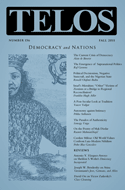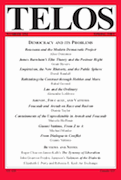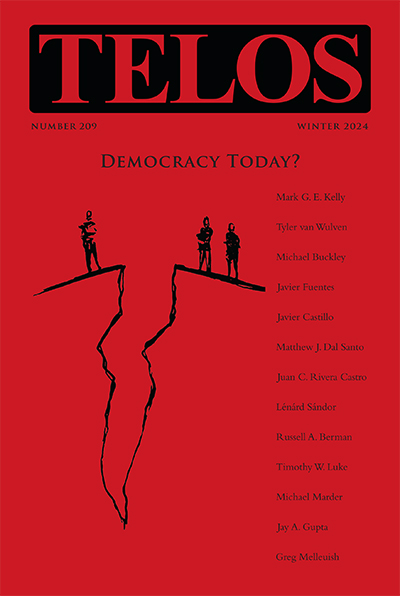By Russell A. Berman · Monday, September 19, 2011 Telos 156 (Fall 2011) is now available for purchase here.
 Will Europe be able to master its debt crisis and prevent the spread of economic instability throughout the eurozone? Will the political leadership in the United States be able to manage the challenge of the debt limit and, more broadly, the ongoing problems with the federal budget? As this issue of Telos goes to press, each of these dramas is still playing out, and the conclusion to neither is predictable. Will the euro crumble, will Washington grind to a halt? Probably not. Yet if Europe’s contagion is ultimately contained, and if the United States dodges the bullet and avoids default, it will only have been in the nick of time. Perhaps some tired observers will heave a sigh of relief and reassure themselves that the system has worked. Of course, escaping catastrophe is better than the alternative, and no one should be wishing for the worst. But this is not a matter of wishful thinking at all. Magic will not save us. On the contrary, this is about contemporary politics and the apparent inability of existing political institutions to address vital matters in an effective manner. Will Europe be able to master its debt crisis and prevent the spread of economic instability throughout the eurozone? Will the political leadership in the United States be able to manage the challenge of the debt limit and, more broadly, the ongoing problems with the federal budget? As this issue of Telos goes to press, each of these dramas is still playing out, and the conclusion to neither is predictable. Will the euro crumble, will Washington grind to a halt? Probably not. Yet if Europe’s contagion is ultimately contained, and if the United States dodges the bullet and avoids default, it will only have been in the nick of time. Perhaps some tired observers will heave a sigh of relief and reassure themselves that the system has worked. Of course, escaping catastrophe is better than the alternative, and no one should be wishing for the worst. But this is not a matter of wishful thinking at all. Magic will not save us. On the contrary, this is about contemporary politics and the apparent inability of existing political institutions to address vital matters in an effective manner.
Continue reading →
By Bassam Tibi · Thursday, June 30, 2011 The ongoing Arab uprising against long-standing authoritarian regimes has sparked hope and admiration for the prospect of democratization. Yet in no country can one yet say that democracy has been firmly established—not yet in Tunisia, nor in Egypt (still under military control), nor in any of the other embattled territories. (Despite sectarian strife the two Arab countries approaching a bit a functioning democracy are Iraq and Lebanon.) Given the instability of democracy in the Arab spring, it is crucial to examine not only the potential of an Islamist participation in it, but also the peril of its hijacking. Unfortunately the western discussion often misperceives the role of Islamists. Islamists have not been the leaders of the uprising; on the contrary, like cautious Leninists, they are hoping to take over, eventually with the help of the exceptional sophisticated organizations of their movements. The fact that ruling dictators in the Middle East have typically presented themselves as the alternative to the Islamist movement indirectly gives undeserved credit to Islamists, who can be misunderstood as opponents of dictatorship. This dynamic makes it harder to touch on the core issues frankly. A solid assessment of Islamism and the winds of change in the Arab world require an adequate understanding of the forces in operation.
Continue reading →
By Alice Ormiston · Friday, April 29, 2011 Alice Ormiston’s “A Tragic Desire: Rousseau and the Modern Democratic Project” appears in Telos 154 (Spring 2011). Read the full version at TELOS Online website.
 This article begins by showing how the desire for justice in the modern democratic tradition is a manifestation of a deeper drive toward unity between nature and reason, as well as self and community. The bulk of the article explores Rousseau’s works as a demonstration that this drive towards unity is tragic in nature—it cannot be fully realized, and at the same time cannot be given up. Furthermore, Rousseau’s inability to accept this desire as tragic, his insistent attempts at creating a total unity between nature and reason, and self and community, leads to its own secondary set of tragedies in his works and his life. The tragic nature of the modern democratic orientation must be recognized and integrated, in order to avoid these secondary tragedies. This article begins by showing how the desire for justice in the modern democratic tradition is a manifestation of a deeper drive toward unity between nature and reason, as well as self and community. The bulk of the article explores Rousseau’s works as a demonstration that this drive towards unity is tragic in nature—it cannot be fully realized, and at the same time cannot be given up. Furthermore, Rousseau’s inability to accept this desire as tragic, his insistent attempts at creating a total unity between nature and reason, and self and community, leads to its own secondary set of tragedies in his works and his life. The tragic nature of the modern democratic orientation must be recognized and integrated, in order to avoid these secondary tragedies.
Continue reading →
By Rahul Govind · Tuesday, April 19, 2011 Rahul Govind’s “Equality, Right, and Identity: Rethinking the Contract through Hobbes and Marx” appears in Telos 154 (Spring 2011). Read the full version at TELOS Online website.
 The following essay is an investigation into the nature of the contract, the way in which the contract indexes “right” and equality, and the textual and historical expressions—as well as echoes—that this has taken from Thomas Hobbes to Karl Marx. The opening set of conceptual remarks lead to a reading of Hobbes’s Leviathan and Marx’s “On the Jewish Question,” arguing that both texts were concerned with theoretically explicating the relationship between right and equality, germane to which was the problematic of the “nation”/community, which was itself conceived via the “Jewish question.” The essay argues that only an attention to Marx’s reformulation of the older problematic, as found in Hobbes, will help us understand the significance of his critique of the (post–)French Revolutionary theory of abstract right, and thereby the need for the development and critique of the field of political economy. Through this exposition of the thread between the conceptualization of the political and political economy, it seeks to reconfigure the canonical texts of Hobbes and Marx in rethinking the interrelations between right, equality, and community within a historico-philosophical horizon. The following essay is an investigation into the nature of the contract, the way in which the contract indexes “right” and equality, and the textual and historical expressions—as well as echoes—that this has taken from Thomas Hobbes to Karl Marx. The opening set of conceptual remarks lead to a reading of Hobbes’s Leviathan and Marx’s “On the Jewish Question,” arguing that both texts were concerned with theoretically explicating the relationship between right and equality, germane to which was the problematic of the “nation”/community, which was itself conceived via the “Jewish question.” The essay argues that only an attention to Marx’s reformulation of the older problematic, as found in Hobbes, will help us understand the significance of his critique of the (post–)French Revolutionary theory of abstract right, and thereby the need for the development and critique of the field of political economy. Through this exposition of the thread between the conceptualization of the political and political economy, it seeks to reconfigure the canonical texts of Hobbes and Marx in rethinking the interrelations between right, equality, and community within a historico-philosophical horizon.
Continue reading →
By François Debrix · Wednesday, July 18, 2007 This is the final part of a review of Jean-Claude Paye’s Global War on Liberty, recently published by Telos Press Publishing and available in our store. Part 1 of the review is here, and part 2 is here. The review will soon appear in full in the journal.
 There is much to be admired in Paye’s path-breaking reflection on the nature of a new normative order that comes to life after the implementation of a permanent state of exception. And he must be congratulated for taking seriously what so many others have only announced, imagined, or theorized, and for performing the painstaking “archeological” work of uncovering the basic rules of formation of the new political regime that hides behind legal exceptionality. Still, towards the end of Global War on Liberty, Paye’s inability to provide a more innovative and thought-provoking critical conclusion is disappointing. Instead, Paye needlessly insists on retrieving the ideas of dictatorship and totalitarianism, as if those concepts could provide a grand conceptual finale to his study. Closing with these obsolete political concepts and labels does not do justice to the originality of Paye’s contribution and potentially diminishes its value. But there are two other errors that become obvious at the end of Global War on Liberty, and they are hard to reconcile with the rest of Paye’s analysis. There is much to be admired in Paye’s path-breaking reflection on the nature of a new normative order that comes to life after the implementation of a permanent state of exception. And he must be congratulated for taking seriously what so many others have only announced, imagined, or theorized, and for performing the painstaking “archeological” work of uncovering the basic rules of formation of the new political regime that hides behind legal exceptionality. Still, towards the end of Global War on Liberty, Paye’s inability to provide a more innovative and thought-provoking critical conclusion is disappointing. Instead, Paye needlessly insists on retrieving the ideas of dictatorship and totalitarianism, as if those concepts could provide a grand conceptual finale to his study. Closing with these obsolete political concepts and labels does not do justice to the originality of Paye’s contribution and potentially diminishes its value. But there are two other errors that become obvious at the end of Global War on Liberty, and they are hard to reconcile with the rest of Paye’s analysis.
Continue reading →
By François Debrix · Tuesday, July 17, 2007 This is the second part of a review of Jean-Claude Paye’s Global War on Liberty, recently published by Telos Press Publishing and available in our store. Part 1 of the review is here, and part 3 is here. The review will soon appear in full in the journal.
Beyond the Suspension of the Law
 Paye writes that “the rule of law becomes increasingly formal, not only because its content, the protection of private life and the defense of individual and public liberties, turns out to be very limited, but also by the practical possibility offered to the executive power to free itself completely from the last safeguards of legal order” (34). He adds: “The strengthening of the executive relative to the other powers makes possible the general and permanent suspension of the law. It is the instrument for setting up a state of exception” (34). For Paye, the state of legal/constitutional exception implemented in most Western democracies is not about a temporary suspension of the law, one that might guarantee a preservation of existing democratic principles in countries like the United States, Great Britain, France, Belgium, Italy, or the European Union in general (the cases that Paye spends his time detailing in Global War on Liberty). More importantly, it is also more than a suppression of democratic legal and judicial systems, and of the individual rights that these normally guarantee, that would become a new rule of permanence, a new long-lasting condition of suspension of the rule of law, whereby politics could become the product of a succession of ad hoc decisions made by government officials and bureaucrats (as Agamben and others have intimated). Paye writes that “the rule of law becomes increasingly formal, not only because its content, the protection of private life and the defense of individual and public liberties, turns out to be very limited, but also by the practical possibility offered to the executive power to free itself completely from the last safeguards of legal order” (34). He adds: “The strengthening of the executive relative to the other powers makes possible the general and permanent suspension of the law. It is the instrument for setting up a state of exception” (34). For Paye, the state of legal/constitutional exception implemented in most Western democracies is not about a temporary suspension of the law, one that might guarantee a preservation of existing democratic principles in countries like the United States, Great Britain, France, Belgium, Italy, or the European Union in general (the cases that Paye spends his time detailing in Global War on Liberty). More importantly, it is also more than a suppression of democratic legal and judicial systems, and of the individual rights that these normally guarantee, that would become a new rule of permanence, a new long-lasting condition of suspension of the rule of law, whereby politics could become the product of a succession of ad hoc decisions made by government officials and bureaucrats (as Agamben and others have intimated).
Continue reading →
|
|
 Will Europe be able to master its debt crisis and prevent the spread of economic instability throughout the eurozone? Will the political leadership in the United States be able to manage the challenge of the debt limit and, more broadly, the ongoing problems with the federal budget? As this issue of Telos goes to press, each of these dramas is still playing out, and the conclusion to neither is predictable. Will the euro crumble, will Washington grind to a halt? Probably not. Yet if Europe’s contagion is ultimately contained, and if the United States dodges the bullet and avoids default, it will only have been in the nick of time. Perhaps some tired observers will heave a sigh of relief and reassure themselves that the system has worked. Of course, escaping catastrophe is better than the alternative, and no one should be wishing for the worst. But this is not a matter of wishful thinking at all. Magic will not save us. On the contrary, this is about contemporary politics and the apparent inability of existing political institutions to address vital matters in an effective manner.
Will Europe be able to master its debt crisis and prevent the spread of economic instability throughout the eurozone? Will the political leadership in the United States be able to manage the challenge of the debt limit and, more broadly, the ongoing problems with the federal budget? As this issue of Telos goes to press, each of these dramas is still playing out, and the conclusion to neither is predictable. Will the euro crumble, will Washington grind to a halt? Probably not. Yet if Europe’s contagion is ultimately contained, and if the United States dodges the bullet and avoids default, it will only have been in the nick of time. Perhaps some tired observers will heave a sigh of relief and reassure themselves that the system has worked. Of course, escaping catastrophe is better than the alternative, and no one should be wishing for the worst. But this is not a matter of wishful thinking at all. Magic will not save us. On the contrary, this is about contemporary politics and the apparent inability of existing political institutions to address vital matters in an effective manner.  This article begins by showing how the desire for justice in the modern democratic tradition is a manifestation of a deeper drive toward unity between nature and reason, as well as self and community. The bulk of the article explores Rousseau’s works as a demonstration that this drive towards unity is tragic in nature—it cannot be fully realized, and at the same time cannot be given up. Furthermore, Rousseau’s inability to accept this desire as tragic, his insistent attempts at creating a total unity between nature and reason, and self and community, leads to its own secondary set of tragedies in his works and his life. The tragic nature of the modern democratic orientation must be recognized and integrated, in order to avoid these secondary tragedies.
This article begins by showing how the desire for justice in the modern democratic tradition is a manifestation of a deeper drive toward unity between nature and reason, as well as self and community. The bulk of the article explores Rousseau’s works as a demonstration that this drive towards unity is tragic in nature—it cannot be fully realized, and at the same time cannot be given up. Furthermore, Rousseau’s inability to accept this desire as tragic, his insistent attempts at creating a total unity between nature and reason, and self and community, leads to its own secondary set of tragedies in his works and his life. The tragic nature of the modern democratic orientation must be recognized and integrated, in order to avoid these secondary tragedies.  There is much to be admired in Paye’s path-breaking reflection on the nature of a new normative order that comes to life after the implementation of a permanent state of exception. And he must be congratulated for taking seriously what so many others have only announced, imagined, or theorized, and for performing the painstaking “archeological” work of uncovering the basic rules of formation of the new political regime that hides behind legal exceptionality. Still, towards the end of Global War on Liberty, Paye’s inability to provide a more innovative and thought-provoking critical conclusion is disappointing. Instead, Paye needlessly insists on retrieving the ideas of dictatorship and totalitarianism, as if those concepts could provide a grand conceptual finale to his study. Closing with these obsolete political concepts and labels does not do justice to the originality of Paye’s contribution and potentially diminishes its value. But there are two other errors that become obvious at the end of Global War on Liberty, and they are hard to reconcile with the rest of Paye’s analysis.
There is much to be admired in Paye’s path-breaking reflection on the nature of a new normative order that comes to life after the implementation of a permanent state of exception. And he must be congratulated for taking seriously what so many others have only announced, imagined, or theorized, and for performing the painstaking “archeological” work of uncovering the basic rules of formation of the new political regime that hides behind legal exceptionality. Still, towards the end of Global War on Liberty, Paye’s inability to provide a more innovative and thought-provoking critical conclusion is disappointing. Instead, Paye needlessly insists on retrieving the ideas of dictatorship and totalitarianism, as if those concepts could provide a grand conceptual finale to his study. Closing with these obsolete political concepts and labels does not do justice to the originality of Paye’s contribution and potentially diminishes its value. But there are two other errors that become obvious at the end of Global War on Liberty, and they are hard to reconcile with the rest of Paye’s analysis.

